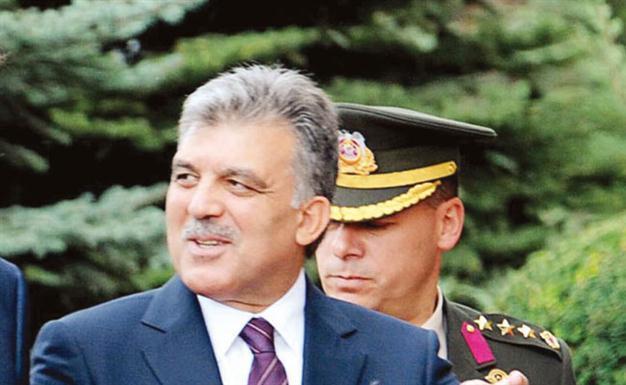Gül predicts fast end for Syrian president
DENİZ ZEYREK ABU DHABI - Radikal

Turkey has no hidden agenda on Syria, says
President Gül. DAILY NEWS photo
The end is nigh for Syrian regime, Gül states Turkish President Gül signals the end game for his Syrian counterpart, claiming that Bashar al-Assad’s fall is inevitable and should not be prolonged
The downfall of Syrian President Bashar al-Assad’s government is inevitable and should no longer be delayed, Turkish President Abdullah Gül told reporters yesterday en route to Abu Dhabi.
“Some think we want a war in Syria. But we have no hidden agenda. We’ve done all without expecting anything in return. We are sorry, but unfortunately Syria is now in the midst of an inevitable process,” he said. “What’s important is that this process doesn’t linger on for long. The end is clear. All that matters [now] is the process, and how painful it will be.”
Turkey has made every effort to realize a transformation led by al-Assad, Gül said. “We told [al-Assad] that one day he will be sorry and that it will be [too little], too late.”
Reflecting on the positive developments in Tunisia and Egypt despite some setbacks, Gül noted the absence of independent institutions under dictatorial regimes.
“The dictatorships not only oppressed people, the development of independent institutions and traditions was also hindered,” the president said. “Thus [their job] is not easy. Just think of the problems that Turkey, as the most democratic, most secular and most developed country in the Islamic world, is going through.”
Addressing speculation that Hamas leader Khaled Mashaal may move to Turkey, Gül said Ankara was the biggest supporter of the Palestinian cause and that Hamas was the elected government in the Gaza Strip.
“[Any move would be] related to the conditions. One should not reject anything categorically,” Gül said, adding that he “does not have information” regarding any wish by Mashaal to relocate to Turkey.
On the Arab Spring, Gül said regional leaders faced a force in the road. “Either we will lead, reforming at home and putting our houses in order through reforms, or foreign intervention will become inevitable. And when that intervention comes, it will be a culture, a country that [foreigners] are unfamiliar with.”
Any such intervention would be like a bull entering the china shop, the president said in reference to Iraq. “Thus, we should lead the reforms in our country, and we should do this fast.”
Iran ‘a regional reality’
Gül also commented on concerns the region was coming under the influence of Iran. “Of course, the region has its realities. But there could be ignorant and irresponsible ones who strive to turn these realities into an element of conflict. Thus, one should act with utmost responsibility,” Gül said. “And that’s what Turkey has been doing.”
Iran has natural links with the region, and one should see all these in a constructive fashion, he said.
Asked about Turkey’s rights record and specific cases in which journalists remain imprisoned, Gül said his “overall stance” was well-known.
“This is the area which has to be protected vigorously by Turkey,” he said. “If the area of freedom of thought, press freedom and human rights gets stained, other [successes] will not be visible, whatever one does,” he said.
Gül also refuted media stories that said the Prime Ministry Inspection Board (BTK) had completed its report in the Hrant Dink murder case.
‘Rational opposition’ against ParisTurkey has been acting rationally in its opposition against a French bill criminalizing denials of the 1915 events as genocide, President Abdullah Gül said.
“This [opposition] made a great impact on France and the world,” Gül said. “People may think differently regarding any issue. They may think in ways that we can never believe or accept. And we may think differently. What matters here is the criminalization of thought.”
With its Senate approving the controversial bill, France has “banned all thought other than the official thinking of the state. And this is making France lose prestige at a level that was never expected,” he said. “You have seen [U.S. Secretary of State Hillary] Clinton’s statements. ‘Our power comes from not banning thought and we won’t embark on such a path,’ she says.”
Gül voiced hope that the path toward a potential rejection of the bill by France’s Constitutional Council remained open.
“We expect this. I believe that many senators and lawmakers will not let France remain under such a shadow,” he said.
